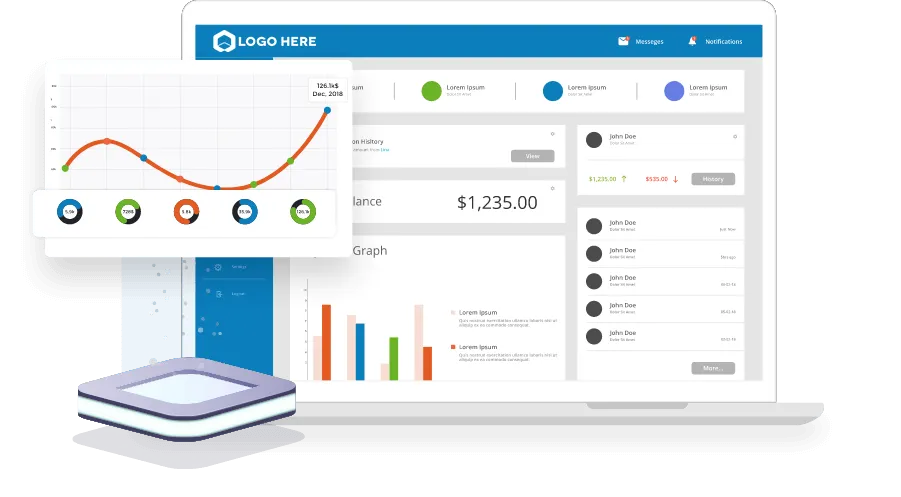Automate & Integrate Your Business With
Technology simplified for all

Automation Consultation
We provide you with guidance on automation. To offer more specific advice, during your consultation you provide some additional information about your business or the processes you're looking to automate. The more details you can share, the better we can tailor the recommendations to your needs.
Industry and Business Type:
Tell me about your industry and the type of business you run (e.g., retail, manufacturing, healthcare, technology).
Current Processes:
Describe the manual processes that you wish to automate. These could be tasks that are repetitive, time-consuming, or prone to human error.
Software and Tools in Use:
Let me know if you are already using any software or tools in your business. This information will help me understand potential integration possibilities.
Business Goals:
Share your main business objectives. Automation can be tailored to support specific goals like increasing efficiency, reducing costs, improving customer experience, or enhancing data accuracy.
Budget:
It's helpful to know your budget constraints, as automation solutions can vary widely in cost.
Team Size and Skills:
Tell me about the size of your team and their technical skills. This will help determine the complexity of the automation solutions that can be implemented.
Data Security and Compliance Requirements:
If your business deals with sensitive data or has specific compliance requirements, please mention them.
Feel free to include any other relevant information or questions you may have about automation. Once I have a better understanding of your needs, I can provide more tailored recommendations to help you successfully automate your business processes.

Lead Management
Lead management services involve the process of acquiring, tracking, and nurturing potential customers or leads from their initial point of contact until they become paying customers. This process is crucial for businesses looking to convert leads into sales and build lasting customer relationships. Lead management services typically encompass a range of activities and technologies to streamline and optimize the lead conversion process. Here are some key aspects of lead management services:
Lead Generation: This involves attracting potential customers through various marketing channels such as websites, social media, email campaigns, content marketing, and advertising. The goal is to capture the interest of individuals who might be interested in your products or services.
Lead Tracking and Monitoring: Once leads are generated, their interactions with your business need to be tracked and monitored. This includes recording their inquiries, website visits, email opens, and other relevant actions to understand their level of interest and engagement.
Lead Scoring: Assigning a score to each lead based on their actions and behavior helps prioritize leads for follow-up. Leads with higher scores typically show more interest and are more likely to convert, allowing your sales team to focus their efforts on the most promising prospects.
CRM Integration: Integrate lead management with Customer Relationship Management (CRM) systems to centralize lead data and facilitate seamless communication between marketing and sales teams.
Lead Nurturing: Not all leads are ready to make an immediate purchase. Lead nurturing involves engaging with leads through personalized and targeted content to build trust, educate them about your offerings, and guide them through the sales funnel until they are ready to make a buying decision.
Automated Workflows: Use marketing automation tools to create automated workflows that trigger specific actions based on lead behavior, such as sending follow-up emails, assigning tasks to sales representatives, or scheduling follow-up calls.
Data Analysis and Reporting: Regularly analyze lead management data to identify trends, bottlenecks, and areas for improvement. Use reporting tools to measure the effectiveness of your lead management efforts and make data-driven decisions.
Lead Conversion Optimization: Continuously refine your lead management processes to improve conversion rates. Test different strategies, messaging, and offers to find what resonates best with your target audience.
Compliance and Data Privacy: Ensure that your lead management processes comply with relevant data protection and privacy regulations to safeguard customer information.
Outsourcing lead management services to specialized companies or using dedicated lead management software can help streamline the process, especially for businesses dealing with large volumes of leads.
Effective lead management is a crucial component of a successful sales and marketing strategy, as it helps businesses capitalize on potential opportunities, maximize their marketing efforts, and ultimately grow their customer base.

Social Media Management
Let's get you connected! Our social media management solution helps you build an online community by "Stopping the scroll" with inviting and interesting content!
Social media management services involve the strategic planning, creation, scheduling, monitoring, and analysis of social media content on behalf of businesses and organizations. These services aim to establish and maintain a strong online presence, engage with the target audience, build brand awareness, drive traffic, and ultimately achieve business objectives. Here are some key aspects of social media management services:
1. Social Media Strategy: Develop a comprehensive social media strategy aligned with the client's business goals. This includes identifying target audience demographics, choosing the most relevant social media platforms, and defining the content and engagement tactics.
2. Content Creation: Create high-quality and engaging content, including text, images, videos, infographics, and other multimedia assets. Content should be tailored to each social media platform and aligned with the brand's identity and messaging.
3. Content Scheduling: Plan and schedule content in advance using social media management tools. Consistent posting at optimal times helps maintain audience engagement and reach.
4. Community Management: Engage with the audience by responding to comments, messages, and mentions promptly. Community managers play a crucial role in building relationships with followers and addressing customer inquiries or concerns.
5. Social Listening: Monitor social media channels for mentions of the brand, industry trends, and customer feedback. Social listening provides valuable insights and helps in reputation management.
6. Influencer Marketing: Identify and collaborate with relevant influencers to amplify the brand's reach and credibility. Influencers can help introduce the brand to new audiences and generate authentic content.
7. Paid Social Advertising: Strategically utilize social media advertising to boost brand visibility, increase website traffic, and drive conversions. This includes creating targeted ad campaigns and monitoring their performance.
8. Analytics and Reporting: Track key performance metrics such as reach, engagement, click-through rates, and conversions. Regular reporting helps in evaluating the effectiveness of social media efforts and making data-driven decisions.
9. Social Media Crisis Management: Be prepared to handle social media crises or negative situations professionally and swiftly. Having a crisis management plan in place can help minimize reputational damage.
10. Stay Updated on Trends: Stay informed about the latest social media trends, algorithm changes, and platform updates. Social media is constantly evolving, and staying ahead of the curve is essential to maintaining a competitive edge.
Social media management services can be provided by in-house social media teams, digital marketing agencies, or specialized social media management companies. The choice depends on the client's needs, budget, and the scale of their social media presence.
Effective social media management is crucial for businesses of all sizes, as it allows them to connect with their audience, humanize their brand, and foster a loyal and engaged community online.

Analytics
Analytics services for technology automations play a vital role in maximizing the benefits and efficiency of automated processes. These services involve the collection, processing, and analysis of data generated by automation tools and systems. The insights gained from analytics help businesses optimize their automation strategies, identify areas for improvement, and make data-driven decisions. Here's how analytic services can support technology automations:
Performance Monitoring: Analytics services can track and monitor the performance of automated processes. Key performance indicators (KPIs) are measured to assess the effectiveness and efficiency of automation initiatives. This includes metrics such as processing time, error rates, completion rates, and resource utilization.
Process Optimization: By analyzing data from automated processes, businesses can identify bottlenecks and areas of inefficiency. Analytics can provide valuable insights into where improvements can be made, leading to streamlined workflows and enhanced productivity.
Data Integrity and Accuracy: Automation relies heavily on data, and analytics can help ensure data accuracy and integrity. By monitoring data quality, businesses can address data discrepancies and maintain a high level of confidence in their automated systems.
Predictive Analytics: Advanced analytics techniques, such as predictive analytics, can be applied to automation data to anticipate potential issues or opportunities. Predictive models can forecast future trends, allowing businesses to proactively address challenges or capitalize on emerging opportunities.
Root Cause Analysis: When issues arise in automated processes, analytics services can perform root cause analysis to determine the underlying reasons for the problems. This helps in implementing corrective actions and preventing similar issues in the future.
Cost Analysis: Analytics services can provide cost analysis, evaluating the financial impact of automation initiatives. This helps businesses assess the return on investment (ROI) of automation projects and make informed decisions about resource allocation.
User Experience Optimization: For automation systems that involve user interactions, analytics can track user behavior and identify areas for improving the user experience. This leads to more user-friendly interfaces and increased user satisfaction.
Security and Compliance: Analytics can monitor automated processes for security breaches and ensure compliance with data protection regulations. It helps in detecting unusual activities and potential security threats.
Real-time Insights: Some analytics services offer real-time monitoring and reporting, providing businesses with immediate visibility into the performance of their automated systems. This enables quick responses to issues and opportunities as they arise.
Continuous Improvement: Analytics services support the concept of continuous improvement in automation. By regularly analyzing data and making iterative adjustments, businesses can keep their automation strategies up to date and efficient.
Incorporating analytics services into technology automations allows businesses to make data-driven decisions, optimize processes, and achieve better outcomes. It enhances the overall effectiveness of automation initiatives and contributes to business growth and success.

Track Your Business With Our
Insights Dashboard
Lorem Ipsum is simply dummy text of the printing and typesetting industry. Lorem Ipsum has been the industry's standard dummy text ever since the 1500s, when an unknown printer took a galley of type and scrambled it to make a type specimen book.
Certified Tech Solutions is a Microsoft Certified Professional organization that has been in business since 2021. Nicole Serralta, M.S., MCP has worked in the technology industry for more than 25 years.



